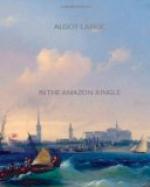There seemed to be few maladies among these people; in fact, during the five weeks I spent with them, I never saw a case of fever nor of anything else. When a person died the body was carried far into the woods, where a fire was built, and it was cremated. The party would then leave in a hurry and never return to the same spot; they were afraid of the Spirit of the Dead. They told me that they could hear the Spirit far off in the forests at night when the moon was shining.
The men were good hunters and were experts in the use of bow and arrow and also the blow-gun, and never failed to bring home a fresh supply of game for the village. This supply was always divided equally, so that no one should receive more than he needed for the day. At first glance the men might appear lazy, but why should they hurry and worry when they have no landlord, and no grocer’s bills to pay; in fact, the value of money is entirely unknown to them.
I was allowed to walk around as I pleased, everybody showing me a kindness for which I shall ever gratefully remember these “savages.” I frequently spent my forenoons on a tree trunk outside the maloca with the Chief, who took a particular interest in my welfare. We would sit for hours and talk, he sometimes pointing at an object and giving its Indian name, which I would repeat until I got the right pronunciation. Thus, gradually instructed, and by watching the men and women as they came and went, day after day, I was able to understand some of their language and learned to answer questions fairly well. They never laughed at my mistakes, but repeated a word until I had it right.
The word of the Chief was law and no one dared appeal from the decisions of this man. In fact, there would have been nobody to appeal to, for the natives believed him vested with mysterious power which made him the ruler of men. I once had occasion to see him use the power which had been given him.
I had accompanied two young Indians, one of whom was the man we had met in the forest on our return trip not far from that fatal tambo No. 3. His name, at least as it sounded to me, was Rere. They carried bows and arrows and I my automatic pistol, although I had no great intention of using it. What little ammunition I had left I desired to keep for an emergency and, besides, I reasoned that I might, at some future time, be able to use the power and noise of the weapon to good advantage if I kept the Indians ignorant of them for the present.
We had scarcely gone a mile, when we discovered on the opposite side of a creek, about one hundred and fifty yards away, a wild hog rooting for food. We were on a slight elevation ourselves and under cover of the brush, while the hog was exposed to view on the next knoll. Almost simultaneously my companions fitted arrows to their bow-strings. Instead of shooting point blank, manipulating the bows with their hands and arms, they placed their great and second




